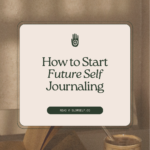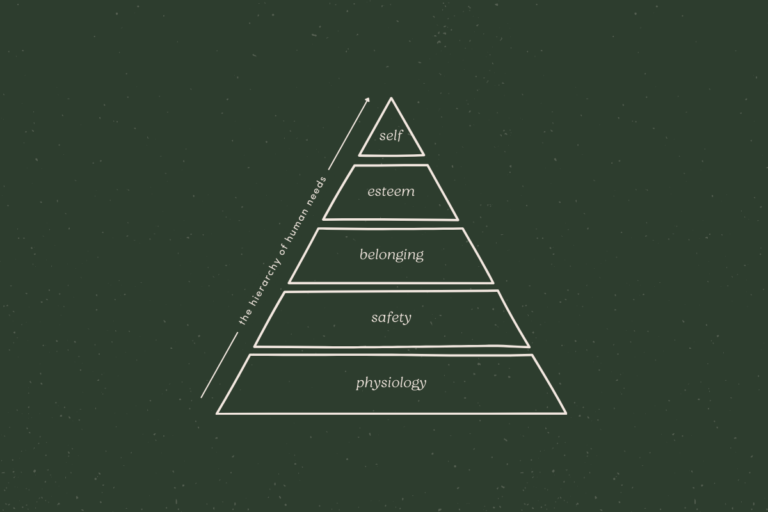
It’s no secret that journaling is a powerful tool to help us get to know ourselves and live more intentionally. The sheer amount of benefits associated with journaling is frankly ridiculous, considering how simple it is.
Perhaps unsurprisingly, it’s a great way to clear your head, work through emotions and make connections between thoughts. But research is revealing more and more incredible benefits of putting pen to paper, from improving our memory and helping us cultivate emotional intelligence to easing symptoms of mental illness, such as depression or anxiety disorders. Oh, and if that wasn’t enough, it can literally strengthen your immune system (
But today we’re going to be diving into how journaling can help us become better versions of ourselves. Specifically, we’re going to highlight the powerful practice that is future self journaling.
What is future self journaling?
Although there are many ways to journal towards an improved, happier version of you, in this article we’re diving into the future self journaling practice invented and popularized by Dr. Nicole LePera (a.k.a. The Holistic Psychologist).
This particular way of journaling takes only 5-8 minutes a day and helps you become conscious of certain patterns in your thoughts and behaviors, and actively work towards shifting them.
At slowself.co we talk quite a bit about how the person we are becoming is rooted in our daily habits. Our ability to evolve into a better version of ourselves depends on our ability to alter these habits. Future self journaling helps you pinpoint a thought pattern or behavior you want to change, and work toward shifting it with grace and compassion over the course of a month (or however long you decide).
While the main focus of the practice is to grow in the direction of who you want to become, it is also a wonderful way to incorporate positive affirmations and gratitude into your days, as you will see.
How to start future self journaling?
Step 1: Choosing which behavior to work on
The first step is deciding on a behavior you want to change or develop. On a fresh page in your journal, answer the questions below (Dr. LePera titles this page ‘Self-Awareness’):
- What behavior or pattern do I want to change?
Choose one behavior that you want to actively work on changing or developing. If you’re struggling to figure this out, try to think about which behavior would make the biggest impact in your life if you managed to change or cultivate it. - Which affirmations will help me achieve this?
Write down any affirmations you come up with that will help inspire you as you work on the behavior you’ve chosen. - How can I practice this new behavior in my daily life?
This last question is really important, because it forces you to think about what changing your behavior will look like concretely. The more specific you are here, the easier it will be to actually make these changes every day.
You now have a clear idea of the behavior you will be working on for the next 30 days (or until you see changes). This little brainstorm has to be completed only once, for each new behavior you want to work on.
Step 2: Journaling towards your future self
Once the preparatory step is done, we can move onto the journaling practice itself. It’s fairly straightforward – we simply write down the following 6 things every day for the next 30 days:
- My daily affirmation
e.g. My actions represent the person I am becoming. - Today I will focus on shifting my pattern of...
e.g. … prioritizing actions that gratify my present self over actions that serve my future self. - I am grateful for…
e.g. … the possibility to create my own schedule, my significant other, and access to free yoga on YouTube. - The person I’m becoming will experience more…
e.g. … self-growth, resilience and alignment. - I have an opportunity to be my future self today when I…
e.g. meditate, prepare a healthy meal and take action on my goals. - When I think about who I’m becoming I feel…
…confident and motivated to take action.
Yes, this may sound repetitive, and that is exactly the point. This type of journaling uses neuroplasticity, meaning it leverages the ability of our brain’s neural pathways to change through constant repetition. By being mindful and intentional about shifting a certain behavioral pattern each and every day, we slowly remodel our brain to develop this new way of behaving.
While your answer to the second question will remain similar throughout the 30 days, it is normal for your answers to the other questions to be slightly different every day. For your daily affirmation, you might tap into the affirmations you listed in the previous step, or write down whatever comes up on that particular day.
Because the questions are always the same and relatively easy to answer, future self journaling is a very short practice that can easily be incorporated into your day. As you go through the questions each day, you will eventually know them by heart, making it even easier.
A few tips…
Tip #1
While you can do future self journaling at any given time of the day, I have found it to be a wonderful way to start the morning with intention. Creating consciousness around the behavior you want to change or develop as part of your morning routine allows it to guide you throughout the day.
Tip #2
Feel free to add more questions to the list that you feel are useful! Personally, I’ve found the addition of “3 traits my future self will have are…” very effective, inspired by YouTuber Jenn Im.
Tip #3
Since future self journaling is most impactful when done every day, turning it into a habit is important. An effective way to do this is by stacking it onto an existing habit you have. For example, I like to do future self journaling right after meditation in the morning. Interestingly, I have found that a daily commitment to this practice makes it easier to stay consistent with other elements of my ideal morning routine (win-win!).
Once the 30 days are over or once you’ve successfully managed to change or develop your chosen behavior, you can start the process all over again focusing on the next behavior.
In this way, a couple of minutes a day can help you consciously take steps toward becoming future you, one habit at a time.






